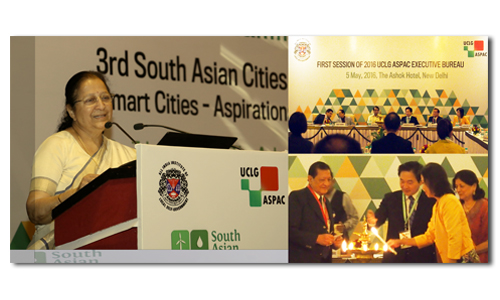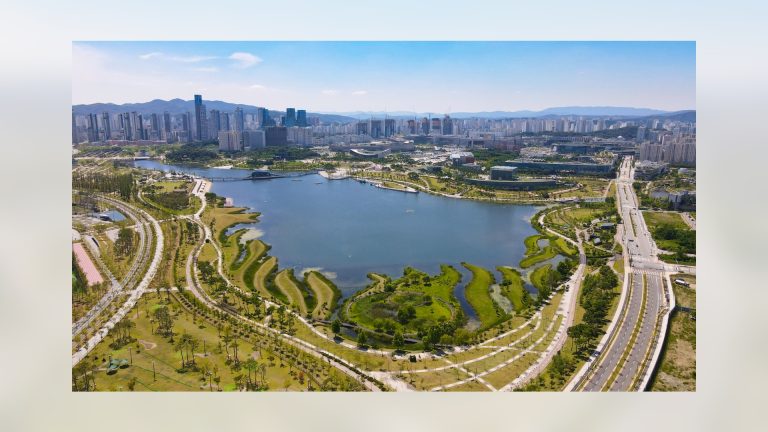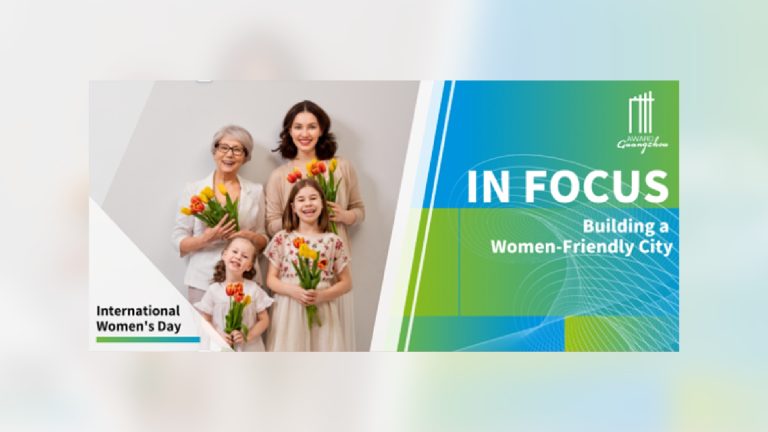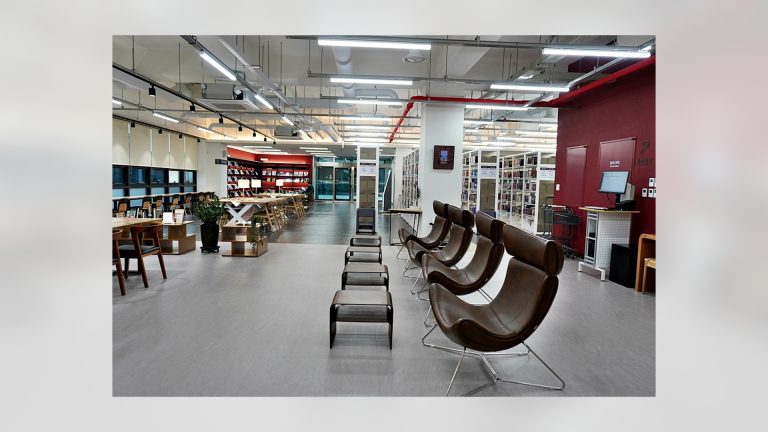NEW DELHI, India (6-7 May 2016) – UCLG ASPAC and All-India Institute of Local Self Government successfully held the 3rd South Asian Cities Summit 2016 – Smart Cities – Aspirations and Challenges. The event was graced by the Chief Guest and House Speaker, Lok Sabha, who set the tone of the conference in her address. Reflecting on city planning, she mentioned that it is worthy to look back on the development of India’s ancient cities which show that planning is not a new trend. More importantly, these serve as reminders to today’s urban practitioners of the key characteristics a city must have: open space, water bodies, parks, and areas that foster cultural and religious practices – alongside being the center of economic affairs.
On the summit’s theme, she shared that the Government of India is carrying out the 100 Smart Cities program, and applauded the event, saying that “No doubt, this type of discussion is necessary […] and South Asian countries, I feel, must come together. Building efficient infrastructure, transport systems, are important issues.” She also left a reminder to the Summit’s delegates to keep in mind the importance of ecology, culture, and religion in the planning of cities. In spite of varied beliefs, she said that in the end, “Our thinking is one and the same. We must protect nature and nature will protect us.”
Joining the Chief Guest in the inauguration session were long-time partners of UCLG ASPAC, from the All India Institute of Local Self-Government, who were also co-organizers. Mr. Ranjit Chavan (President of AIILSG, and Co-President of UCLG ASPAC), Dr. Jatin Modi (President Emeritus), and Capt. Anant Modi (Director General) delivered welcome remarks and opening speeches. They highlighted the importance of India and the South Asia region, particularly their growth potential and the drive towards more sustainable and prosperous cities through the smart cities concept. Dr. Chavan noted that South Asia has been much less successful than East Asia in terms of its share in global GDP, despite also having a high population rate and highly-valued skills.
UCLG ASPAC Secretary General Dr. Bernadia Tjandradewi also addressed the audience. She shared about the prominence of Indian philosophy and culture in her home country, Indonesia, such as seen in names or television showing Bollywood films and shows. Relating this to development, she pointed out that “Development has to be founded on culture. We don’t want every place to be the same when we talk about development, a place’s character comes from its cultural identity.” In addition, she said that what makes cities smart is investing on its people. She also highlighted south-south cooperation, connectivity, and UCLG ASPAC’s role in the Habitat III process.
Panel Sessions – How to make cities “smart”
The South Asian Cities summit tackled themes that reinforce the concept of smart cities. This includes urban rejuvenation, the use of ICT tools, innovative urban governance and leadership, efficient urban mobility, and inclusiveness. Eminent speakers, academicians, mayors, and other urbanists formed the panel for 8 sessions. Among them were partners and members of UCLG ASPAC. Dr. D. Ajay Suri of Cities Alliance talked about heritage-based planning and development, while other members shared their local government’s efforts and experiences. Guangzhou Vice Mayor Cai Chaolin discussed the Guangzhou Innovation Award, noting that innovation is the answer to balancing economic growth and environmental protection.
Mr. Lawrence Yule, who serves as President of Local Government New Zealand and Mayor of Hastings District, clearly described the context in New Zealand which he says has “a very devolved system.” In this, citizens directly take part in decision-making which is completely transparent. Other values they practice are volunteerism and inclusivity. Often, he said, local authority provides machinery/infrastructure and people participate or take initiative in developing their own community (ex. planting trees).
Gender mainstreaming was also integral in the discussion on smart cities. Ms. Kalpana Viswanath of Jagori, a non-profit organization for women’s empowerment, and founder of the Safetipin mobile app, narrated the greater challenge for women in public transit. Research shows that women do multi-purpose trips (combining work, domestic chores, childcare, etc.) and more short trips than men, and are forced to bear the burden of poor public transport facilities, and also feel less safe. The Safetipin app, a handy repository of data, allows users to conduct safety audits and report harassment or hazards. It informs the safety of an area and helps produce evidence-based data useful for planning. This best practice is expanding and audits can be done for bus stops, terminals, and walk paths. Factors that are rated include lighting, visibility, and security.
Other members who enriched the sessions were from Jambi City (Mayor H. Syarif Fasha), Maldives Local Government Authority (Mr. Farooq Mohamed, CEO), Thimphu City (Mr. Namgay Tshering), Daejeon City (Director General Sohn Chul-Woong), Jakarta City (Mr. Setiaji, Head of Smart City Management Unit), and CLAIR Singapore (Mr. Kenjiro Hashimoto). Dr. Tjandradewi moderated the session on “Moving Cities with Ease and Comfort” on building efficient urban mobility.
Delhi Declaration – Smart Cities in South Asia
One of the outputs of the summit is the Delhi Declaration – Smart Cities in South Asia, which solidifies “a spirit of partnership for development […] through the South Asian Mayors’ Forum.” The Delhi Declaration outlines commitments from the delegates, particularly the smart and human-centered development of cities. This covers improvements to build institutional capacity, inclusiveness, integration (in transport, the rural-urban discourse, etc.), good governance, and greater regional cooperation.
To obtain support for turning the words into implementable action, speakers in the closing session recalled Chief Guest Lok Sobha’s vow to submit the outputs of the Summit to the Indian Parliament. UCLG ASPAC will also carry through the Delhi Declaration to the Habitat III process towards a New Urban Agenda.
***
The 3rd South Asian Cities Summit was held back-to-back with the First Session of the UCLG ASPAC Executive Bureau and the Meeting of the Standing Committees on Women in Local Governments and South-South West Asia. UCLG ASPAC and AIILSG would like to thank everyone who helped in making the event a success.











